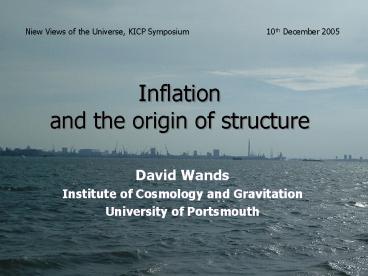Inflation and the origin of structure - PowerPoint PPT Presentation
Title:
Inflation and the origin of structure
Description:
advertisement: see talk by Andy Mennim on Monday! primordial perturbations from scalar fields ... Lyth & Rodriguez (2005) non-Gaussianity from curvaton decay ... – PowerPoint PPT presentation
Number of Views:47
Avg rating:3.0/5.0
Title: Inflation and the origin of structure
1
Inflation and the origin of structure
Niew Views of the Universe, KICP Symposium
10th December 2005
- David Wands
- Institute of Cosmology and Gravitation
- University of Portsmouth
2
Standard model of structure formation
- primordial perturbations
- in cosmic microwave background
3
Cosmological inflation
Starobinsky (1980) Guth (1981)
- period of accelerated expansion in the very
early universe - requires negative pressure
- e.g. self-interacting scalar field
- speculative and uncertain physics
4
Wilkinson Microwave Anisotropy Probe February
2003
- coherent oscillations
- in photon-baryon plasma
- due to primordial density perturbations
- on super-horizon scales
5
vacuum fluctuationsswept up by accelerated
expansion
linking the very small to the very large!
- small-scale/underdamped zero-point fluctuations
- large-scale/overdamped perturbations in growing
mode - linear evolution ? Gaussian random field
Hawking 82, Starobinsky 82, Guth Pi 82
fluctuations of any scalar light fields (mlt3H/2)
frozen-in on large scales
6
inflation probes high energies
- cosmic expansion on large scales
- reconstruct inflaton potential
- modified Friedmann equation
- quantum vacuum on small scales
- trans-Planckian effects (modified dispersion
relation, Lorentz-violation...)
7
- Field perturbations on a brane
- coupled to metric perturbations
- recover 4D gravity at low energies
- but probe 5D at high energies
- 5D backreaction at high energy
- can damp small scale oscillations
Koyama, Mizuno Wands 05
advertisement see talk by Andy Mennim on Monday!
backreaction from 5D
8
primordial perturbations from scalar fields
t
in radiation-dominated era curvature perturbation
? on uniform-density hypersurface
- during inflation field perturbations
?(x,ti) on initial spatially-flat hypersurface
x
on large scales, neglect spatial gradients, treat
as separate universes
Sasaki Stewart 96
9
density perturbations from inflaton field
perturbations
- quantum fluctuations on spatially flat (?N0)
hypersurfaces during inflation - produce density perturbations in
radiation-dominated era
10
tensor metric perturbations
- transverse, traceless metric perturbations
- amplitude, h(t), obeys same wave equation for
massless field - remain decoupled from matter perturbations
11
smoking gun for inflation...
- inflation predicts primordial gravitational wave
background - could be
- or could be
- only detectable if inflationary scale gt 10 15 GeV
12
Seljak et al (2004)
13
but fluctuations in other fields can also perturb
radiation density after inflation
- coupled fields during slow-roll during inflation
- Starobinski Yokoyama Sasaki Stewart
Mukhanov Steinhardt Linde, Garcia-Bellido
Wands.... (1995) - curvaton decay after inflation
- weakly-coupled, late-decaying scalar field
- Enqvist Sloth Lyth Wands Moroi Takahashi
(2001) - inhomogeneous / modulated reheating or
preheating - inflaton decay-rate modulated by another light
field - Dvali, Gruzinov Zaldariaga Kofman (2003)
Kolb, Riotto Vallinotto (2004) - inhomogeneous end of inflation
- Lyth Salem (2005)
14
primordial perturbations from isocurvature fields
during inflation
- quantum fluctuations on spatially flat (?N0)
hypersurfaces during inflation - produce density perturbations in
radiation-dominated era - amplitude depends upon physics
- but spectral tilt set during inflation
where N(?) dependent on physics
15
chaotic inflation
- inflaton perturbations
16
Seljak et al (2004)
17
distinctive observational predictions
- inflaton perturbations
- adiabatic
- no isocurvature perturbations
- Gaussian
- isocurvature field perturbations
- non-adiabatic
- possible residual isocurvature modes...
- ... correlated with curvature perturbation
- possible non-Gaussianity
18
linear evolution -gt Gaussian perturbations stay
Gaussiannon-linear evolution -gt non-Gaussianity!
single-field inflation Maldacena (2002)
Acquaviva, Bartolo, Matarrese Riotto
(2002) beyond slow roll Creminelli
Zaldarriaga (2003) Lidsey Seery
(2004) multi-field inflation Rigopoulos,
Shellard van Tent (2003) Lyth Rodriguez
(2004) Allen, Gupta Wands (2005)
Gaussian field perturbations to first
order give non-Gaussian metric perturbation to
second order
19
local non-Gaussianity
gives bispectrum
constraints from WMAP -58 lt fNL lt 134
more data to come...
20
Detectable non-Gaussianity can come from
non-adiabatic perturbations in non-inflaton fields
Lyth Rodriguez (2005)
- perturbation due to inflaton field
- where
- can be calculated during inflation
- N,?? must be small during slow-roll inflation
- but perturbations from non-adiabatic
perturbations dependent upon subsequent expansion
history
21
non-Gaussianity from curvaton decay
constraints on fNL from WMAP - fNL lt 58
hence ??,decay gt 0.01 and 10 -5 lt ??/? lt 10 -3
22
Conclusions
- Inflation links very small scale vacuum
fluctuations to very large scale structure of our
universe - Precision cosmology (especially cosmic microwave
background data) offer detailed measurements of
primordial density perturbations - Gravitational waves, primordial isocurvature
perturbations and/or non-Gaussianity could
provide valuable info about origin of
perturbations - Single-field slow-roll inflation predicts
adiabatic density perturbations with negligible
non-Gaussianity could give detectable
gravitational waves - Multi-field inflation allows non-adiabatic
perturbations during inflation, which could give
detectable primordial isocurvature perturbations
and/or local non-Gaussianity

